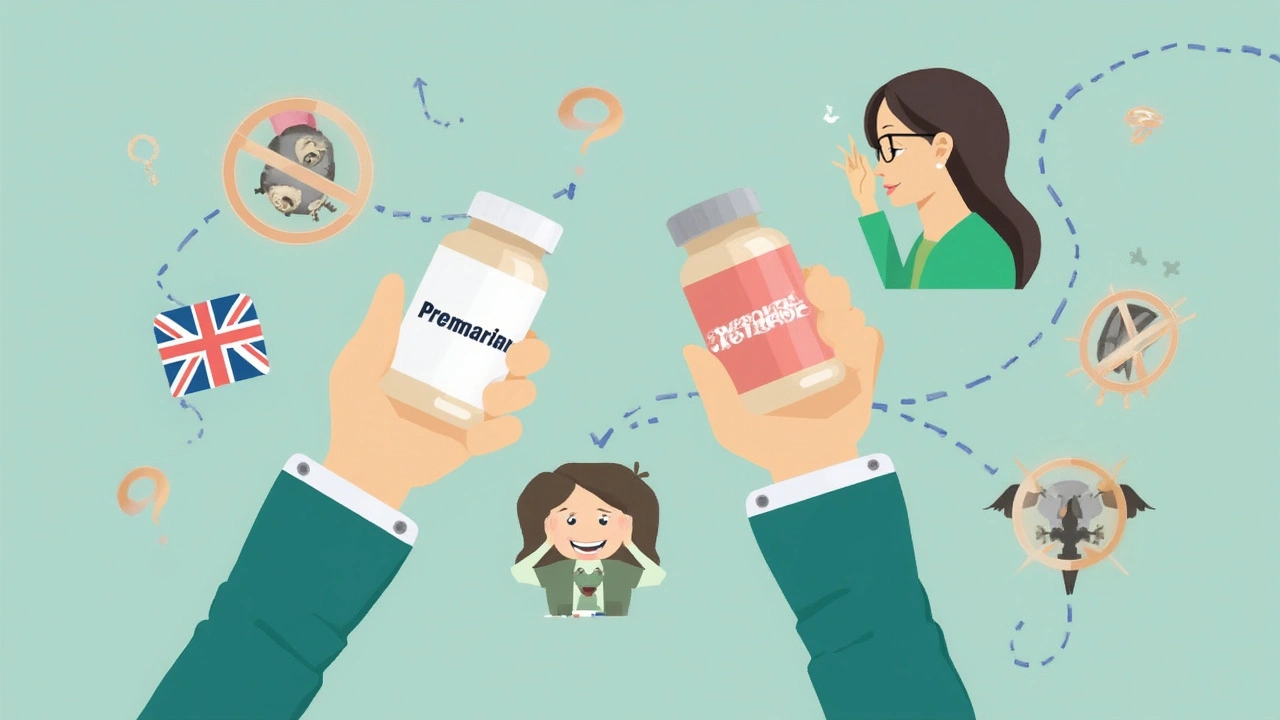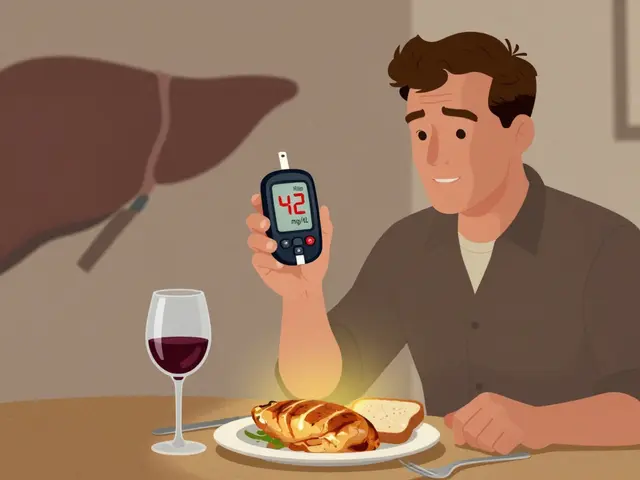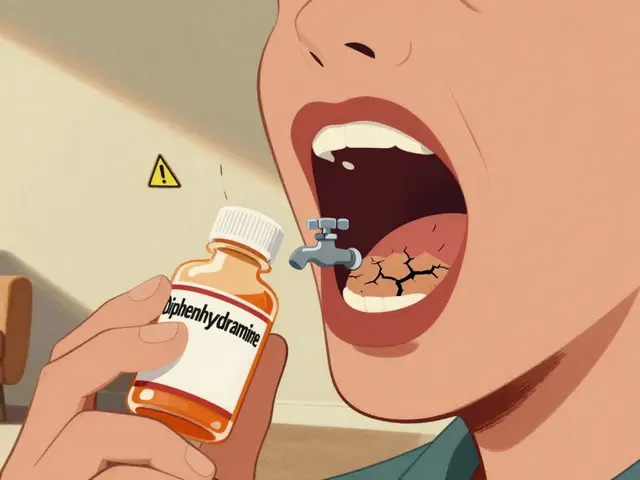Imagine a medicine made from pregnant horses’ urine. Sounds a little wild, right? Yet, some of the most common prescriptions for menopausal women in the U.S. and surrounding countries stem from just that. We're talking about Premarin, a name that’s featured in millions of medicine cabinets, debated over kitchen tables, and at the center of heated conversations in doctor’s offices. Not just because of what it does, but because of how it’s made and what it means for the women who take it and the animals involved. This isn’t your typical hormone therapy—it’s a story laced with science, ethical questions, and the day-to-day experiences of real people.
What Is Premarin and Why Is It Prescribed?
Premarin is a brand of conjugated estrogens, primarily sourced from the urine of pregnant mares (female horses). The name is actually short for "PREgnant MARes' urINe." Approved by the FDA since 1942, Premarin is most often prescribed to women dealing with hot flashes, night sweats, and dryness linked to menopause. The logic is simple: as women go through menopause, their natural estrogen levels drop. This can bring on a handful of tough symptoms, from fatigue to mood swings, and even raise the risk of osteoporosis.
Doctors have used Premarin as a go-to remedy for these symptoms because it delivers a dose of estrogen—one of the hormones that takes a nosedive in menopause. For years, the standard advice was to start hormone therapy at the first taste of severe symptoms. But, like with any drug, time tells new stories. As more folks used Premarin, researchers started learning not just how well it worked, but also what risks might tag along for the ride.
If you’re curious about the numbers, in the early 2000s, as menopause hormone therapy peaked, more than 9 million women in the U.S. had Premarin on their daily roster. The stats dropped a bit after 2002, when a major Women’s Health Initiative (WHI) study linked hormone therapy with increased risks of breast cancer, heart attack, and stroke—a bombshell that sent shockwaves through both the medical world and popular media.
Table: Typical Uses for Premarin
| Medical Condition | How Premarin Helps |
|---|---|
| Menopausal Symptoms | Reduces hot flashes, night sweats, mood swings, vaginal dryness |
| Prevention of Osteoporosis | Helps keep bones strong when estrogen drops post-menopause |
| Ovarian Failure or Removal | Replaces lost estrogen in younger women with early menopause |
| Certain Cancers | May be part of treatment for specific cancers, to minimize symptoms or help healing after treatment |
No surprise, then, that Premarin became a staple for OBGYNs. However, if you’ve got a family history of cancer, blood clots, or if you’ve been told to be careful with hormone meds, your doctor will probably take a close look at these details before reaching for the prescription pad. It’s not a ‘one-size-fits-all’ solution and should only be taken when symptoms are truly affecting your quality of life.

The Premarin Controversy: Production, Ethics, and Animal Welfare
Not every prescription comes with animal ethics in tow. Here, the source of Premarin is hard to ignore—and it’s stirred strong feelings from both animal welfare advocates and everyday consumers who never realized what was in their hormone pill. Let’s cut straight to how Premarin gets from barnyard to blister pack.
The manufacturers keep about 30,000 pregnant mares on so-called "PMU farms" across North America and abroad. These mares are often kept confined, hooked up to urine collection bags for months at a time. Critics say this process is cruel, forcing animals to live in stressful, uncomfortable conditions for the sake of mass-producing a hormone blend that, as of 2025, can be produced synthetically. The foals born are often unwanted; some end up in slaughter, others are sold off with barely a record kept. Several investigations over the years have uncovered tough-to-see images and employee confessions—not exactly the kind of thing most people expect when picking up a bottle of prescription pills.
Now, to be fair, the manufacturers claim the mares are well-treated. They point to animal welfare guidelines and inspect their facilities, arguing that animal care is a priority because their business depends on healthy animals. Still, independent groups challenge these claims, urging for more oversight and harder alternatives. And there’s another angle: some women say they feel uncomfortable using any medication that relies on animals in this way. My spouse, Imogen, for example, asked her doctor for synthetic options, and her OB welcomed the conversation—she wasn’t the only one with questions.
Here’s something wild: alternatives that don’t use animal sources have come a long way in just the last decade. You can find synthetic and “bioidentical” estrogen therapies that aim to mimic the body’s hormones more closely, without relying on horses or animal sources. Knowing your options is part of being a smart health consumer.
If you’re thinking, “Hold up, does Premarin actually work better than the rest?”—the research stacks up pretty equally for most symptoms. The benefits (and risks) of estrogen therapy don’t seem to depend on the horse factor, but rather on the estrogen itself and how your body handles it. That means if you want to skip the animal-derived part, you’ve got solid options to discuss with your doctor.
The PMU industry is smaller than 30 years ago, as awareness has changed prescriptions and encouraged some companies to blend synthetic methods. Still, if this piece of the process matters to you—maybe for your own peace of mind or for ethical reasons—it’s worth bringing up at your next appointment. Sometimes it takes just one good question to open a whole new path.

Premarin Side Effects, Risks, and Smart Alternatives
Hormone therapy isn’t a one-way ticket to happy land. Like anything powerful, Premarin carries its side effects and risks. Some women feel years younger on estrogen; others end up with headaches, bloating, or worse. And the story doesn’t end there—the “risks and rewards” math is different for everyone.
Let’s get concrete. Common side effects for Premarin include nausea, fluid retention (goodbye, skinny jeans), weight gain, breast tenderness, headache, and occasionally spotting or irregular bleeding. Your risk of these goes up if you take high doses or use it for a long time. And then, there are the more serious risks: long-term use of Premarin can increase your risk of endometrial cancer (if you still have your uterus), blood clots, stroke, or even breast cancer. If you’re over 65, that list includes dementia and heart disease. That’s hefty, so it’s no wonder the FDA and specialists preach “the lowest dose for the shortest time.”
Check out what the WHI study found: women on combination hormone therapy (estrogen plus progestin) had about a 26% increase in breast cancer risk and higher rates of heart attacks and strokes compared to those on a placebo. The study, started in 1991 with more than 16,000 women, changed how experts see long-term hormone therapy. Still, those who took only estrogen (say, after having a hysterectomy) showed fewer of these problems but had a higher risk of stroke and blood clots. The message? Personalization is everything.
Table: Side Effects and Risk Factors with Premarin Use
| Potential Side Effect | Who’s at Higher Risk |
|---|---|
| Blood Clots | History of clots, smokers, over age 60 |
| Breast Cancer | Family history, long-term use, overweight |
| Stroke | High blood pressure, diabetes, advanced age |
| Weight Gain | Those prone to fluid retention, inactivity |
| Headache/Migraine | History of migraines |
People often ask about “bioidentical” estrogens—think of these as lab-made hormones that match human estrogen. Unlike Premarin, which is a mix of horse and human estrogen forms, bioidenticals are a closer copy of what your ovaries made before menopause. You can get them from pharmacies with a prescription, and some are made to order (compounded) if you want even more control over the dose and blend.
But don’t get swept away by the hype. Compounded hormones aren’t FDA-regulated like mainstream products, so there can be variation in quality and dosage. Stick with reputable pharmacies, and check in with your healthcare provider about monitoring—especially if you have a family history of cancer or blood clots. If traditional hormone therapy isn’t safe for you, some women find relief from non-hormonal meds, lifestyle tweaks, or even plant-based therapies (like black cohosh, soy, or flaxseed) for milder symptoms—but results can vary, and there’s less proof for big results.
Tips if you’re considering, taking, or planning to stop Premarin:
- Ask your provider about all the options—synthetic, bioidentical, and non-hormonal.
- Review your own personal and family medical history, not just the averages.
- Go in for annual checkups and talk about new symptoms right away.
- Use the lowest effective dose for the shortest necessary time.
- If you notice side effects—even subtle ones—bring them up sooner rather than later.
- If it matters to you, ask where your prescription comes from, and whether an animal-free version is available.
- Don’t stop hormone therapy suddenly without medical input; tapering is key with some meds.
- If you take other medicines (blood thinners, antidepressants, etc.), ask whether they mix safely with estrogen therapy.
Premarin isn’t just a prescription; it’s a medical, social, and even ethical decision. You get the best results when you’re informed and involved in the conversation. Talk with someone you trust, be honest about what matters to you, and find the plan that actually fits your life.







Jasmine L
16 June 2025 - 17:21 PM
Wow, I had no idea Premarin came from horse pee. 😳 My OB mentioned alternatives but I didn’t dig deeper-time to ask about bioidenticals. Thanks for laying this out so clearly.
Dipali patel
18 June 2025 - 05:28 AM
THIS IS A COVER-UP. The FDA and Big Pharma are in bed with the PMU farms. They know synthetic estrogen is cheaper and safer, but they keep pushing horse urine because it’s patented and profitable. They’re silencing whistleblowers too-I’ve seen the redacted emails. Don’t trust your doctor. Ask for the source code of your pill. #PremarinCoverup
lisa zebastian
19 June 2025 - 22:12 PM
Of course it’s made from horse urine. Everything in pharma is. You think your antidepressants are grown in a lab? Nah. They’re distilled from the tears of goats and the dreams of interns. The real scandal is that we’re still using 1940s tech when we could be injecting nanobots that sync with our chakras.
Jessie Bellen
20 June 2025 - 09:14 AM
Stop taking it. You’re just one pill away from a blood clot and a breast tumor. Your doctor doesn’t care. They get paid per script. Get off hormones. Go eat flaxseed. Cry less. Move more. Done.
Jasmine Kara
21 June 2025 - 06:32 AM
my doc gave me premarin and i didnt even know it was from horses until i read this. now i feel kinda icky. but i also feel better. so… what do i do? help??
Richie Lasit
21 June 2025 - 12:40 PM
Hey, I get it-you’re torn. I was too. My wife switched to a bioidentical patch after reading the same stuff, and she’s been way more chill. No more midnight sweats, no guilt. It’s not about being perfect, it’s about being informed. You got this.
arthur ball
22 June 2025 - 15:04 PM
Okay, so imagine this: your body’s like a vintage car. Premarin? It’s like pouring diesel into a gasoline engine. It runs, kinda. But it sputters. Now, bioidenticals? That’s premium fuel-tailored, clean, smooth. And the horses? They’re not villains, they’re just caught in a broken system. We can do better. We owe it to them-and to ourselves.
Harrison Dearing
23 June 2025 - 05:09 AM
Ugh. Another ‘woke’ health post. Next you’ll say coffee is made from demon tears. Premarin works. I’ve been on it for 12 years. My bones are fine. My hot flashes? Gone. If you want to cry over horses, go volunteer at a sanctuary. Don’t guilt-trip women who just want to sleep through the night.
Justice Ward
23 June 2025 - 06:51 AM
I used to think ‘natural’ meant ‘from nature.’ Now I know it just means ‘exploited without consent.’ The irony is thick enough to spread on toast. We want our hormones to feel like us, but we’re okay with a horse’s suffering to get them? That’s not science. That’s just… sad. I switched to a compounded bioidentical last year. My mood? Better. My conscience? Clearer.
bhuvanesh kankani
24 June 2025 - 01:35 AM
In India, we have Ayurvedic alternatives like Shatavari and Ashwagandha for menopausal symptoms. They may not be as fast-acting, but they work gently, without harming animals or triggering clotting risks. Many women here use them successfully. Perhaps a hybrid approach-integrative, not oppositional-is the path forward.
maria norman
24 June 2025 - 04:55 AM
So we’re now morally obligated to take less effective drugs because a horse had to pee in a bag? How many babies were born via IVF using donor eggs from women who were paid $5,000? How many cows were pumped with rBGH to make your cheese? We pick our ethical battles like a child picking candy-conveniently. The real issue isn’t the horse. It’s our willingness to pay for convenience while pretending we’re virtuous.
Iris Schaper
24 June 2025 - 11:41 AM
just read this and i’m crying. not because of the horses. because i’ve been on this stuff for 8 years and never thought to ask. i feel like a dumbass. but also… kinda free? like i can choose now. thanks for the nudge.